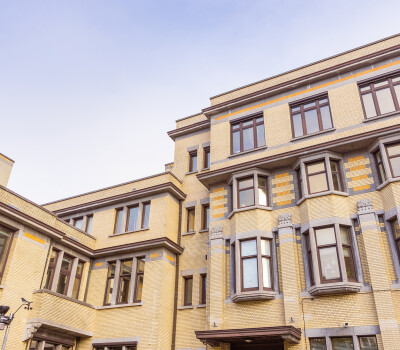ITM postdoctoral researcher Saleh Aljadeeah receives King Baudouin Foundation - Maurange Fund springboard grant

Saleh Aljadeeah, postdoctoral researcher in the Equity and Health Unit, receives the King Baudouin Foundation’s Maurange Fund springboard grant for his research project ‘Access to essential medicines at primary health care level in regions affected by conflict: the case of hypertension, diabetes, and epilepsy essential medicines in Northern Syria’. This grant allows young researchers to perform research on the provision of interdisciplinary primary health care.
Saleh, tell us a bit about your background.
I am from Syria, and I am a pharmacist by training. In 2022, I obtained my PhD in Germany, at the University of Beyreuth, in humanitarian healthcare. I have been working with displaced persons, specialising in access to medicines within humanitarian settings.
In Germany, migration was peeking between 2014 and 2016. I was overseeing the health screening procedure of refugees in the reception centres that were being put up by the German Red Cross. 200-300 people needed to be screened on a weekly basis. They got registered, and then they were screened, notably for tuberculosis, but also for other diseases. In Germany, cities and municipalities are responsible for providing access to health care to newly arrived people. However, they only cover basic needs. This was my motivation to start my research and led me to further investigate the question of ensuring health care access to displaced people with chronic conditions.
Your current KBF project focuses on distribution of medicine in northern Syria. Why is that?
After my studies in Syria, I worked as a pharmacist in the Raqa National Hospital in Raqa, northern Syria. I was confronted daily with the research questions that I’m now working on. So for this project I chose to focus on a geographical area that I know well. I left the country, but I’m still following the news in that region. The idea is that my findings can later be applied to other conflict areas.
Your research project is about chronic (or non-communicable) diseases. Your particular focus is on hypertension, diabetes and epilepsy. Why?
My driver to study chronic diseases is the affected persons’ need for continuous access to medicines. The majority of other studies with displaced people focus on injuries or infectious diseases. Don’t get me wrong, that is a serious challenge, but for me, the real challenge is the follow up on very common, but in their case, often neglected cases.
In my research, the real question is: ‘when a war breaks out, what happens to the organisation of medicine supply?’ In normal circumstances, in peaceful periods, there’s always a system: governments steer the procedures and the distribution of medicines. But what happens if that isn’t the case anymore? Research is an essential step to understand how medicine distribution should be organised. In my current research, I focus on the actors, the stakeholders in crisis situations. International NGOs are an important player in the takeover of medicine distribution. But also private persons. Family members across the border may send in medicine that they were lucky to find, but we need to think about their quality. Quality assurance certainly is a key issue.
The outcomes of the current research will be shared with international NGOs, policymakers, governments that are responsible for medicine distribution, and the wider public of course. Together with pharmaceutical expert Raffaella Ravinetto and the Head of the Unit of Health Equity, Karina Kielmann, we are lucky to be part of a European consortium. Together with colleagues from other research institutions, we will look at refugees’ access to health care. We are analysing the evidence, and we have already defined a few gaps. We aim to extend our research to low- and middle-income countries, and we have our eyes set on Horizon Europe for future funding.
You receive a springboard grant. What about your outlook on your future scientific career?
There’s work to do for the next coming years and both access to medicine as well as the resilience of provisional health systems are relevant topics; you only have to look at what is happening in Ukraine today. We see that there is significant social and political interest for this topic, which confirms that there is great need for research.
Additionally, I also applied to a FWO postdoctoral fellowship. The current King Baudouin research project would be a prelude to the FWO project that I handed in, which goes further: it focuses on strengthening the resilience of pharmaceutical systems during humanitarian crises.
If you had one message, what one would it be?
Access to medicines is a fundamental right! Many people live in precarious conditions. To ease these conditions, we need to make sure that people do not suffer a double burden: that of conflict and of chronic disease.
On a more personal note: I hope my story motivates other researchers to apply for additional funding. Just try your best and apply! If an organisation finds your research interesting but cannot finance it straight away, they might call you back, or help find other possibilities. Something good will come out of this, I experienced it myself. Don’t let a low success rate discourage you.
Saleh Aljadeeah is active in the Equity and Health Unit of ITM's Department of Public Health.
Spread the word! Share this story on









